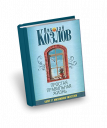Примечания
Глава 5. Потребительские рынки и покупательское поведение потребителей
1 Подготовлено автором на основе следующих материалов: „The $100 Million Object Lesson”. — Fortune, January 1971; „The End of Corfam”. — Wall Street Journal, March 17, 1971, p. 1.
2 См.: „Statistical Abstract of the United States”, 1980.
3 См.: Kevin A. Wall. „New Market: Among Blacks, the Haves Are Now Overtaking the Have-Nots”. — Advertising Age, February 11, 1974, p. 35—36; Mary Jane Schlinger and Joseph T. Plummer. „Advertising in Black and White”. — Journal of Marketing Research, May 1972, p. 149—153; Raymond A. Bauer and Scott M. Cunningham. „The Negro Market”. — Journal of Advertising Research, April 1970, p. 3—12.
4 Melvin Helitzer and Carl Heyel. „The Youth Market”. N.Y., „Media Books”, 1970, p. 58; George W. Schiele. „How to Reach the Young Consumer”. — Harvard Business Review, March-April 1974, p. 77—86.
5 См.: „The Graying of America”. — Newsweek, February 28, 1977, p. 50—65.
6 См.: Rena Bartos. „What Every Marketer Should Know about Women”. — Harvard Business Review, May-June 1978, p. 73—85.
7 См.: A. H. Kizilbash and E. T. Garman. „Grocery Retailing in Spanish Neighborhoods”. — Journal of Retailing, Winter 1975—76, p. 15—22 ff.
8 См.: Leon G. Schiffman and Leslie Lazar Kanuk. „Consumer Behavior”. Englewood Cliffs, N.J., „Prentice-Hall”, 1978, p. 343—356.
9 См.: Harry L. Davis. „Decision Making within the Household”. — Journal of Consumer Research, March 1976, p. 241—260; Harry L. Davis and Benny P. Rigaux. „Perception of Marital Roles in Decision Processes”. — Journal of Consumer Research, June 1974, p. 51—60; Harry L. Davis. „Dimensions of Marital Roles in Consumer Decision-Making”. — Journal of Marketing Research, May 1970, p. 168—177.
10 См.: „Flaunting Wealth: It's Back in Style”. — U.S. News & World Report, September 21, 1981, p. 61—64.
11 CM.:Gail Sheehy. „Passages: Predictable Crises in Adult Life”. N. Y., „Dutton”, 1974; Roger Gould. „Transformations”. N.Y., „Simon & Schuster”, 1978.
12 См.: Raymond L. Horton. „Some Relationships Between Personality and Consumer Decision-Making”. — Journal of Marketing Research, May, 1979, p. 244—245.
13 Более подробно об этом можно прочесть в следующих работах: Edward L. Grubb and Harrison L. Grathwohl. „Consumer Self-Concept, Symbolism, and Market Behavior: A Theoretical Approach”. — Journal of Marketing, October 1967, p. 22—27; Ira J. Dolich. „Congruence Relationships Between Self-images and Product Brands”. — Journal of Marketing Research, February 1969, p. 40—47; E. Laird Landon, Jr. „The Differential Role of Self-Concept and Ideal Self-Concept in Consumer Purchase Behavior”. — Journal of Consumer Research, September 1974, p. 44—51.
14 См.: Abraham H. Maslow. „Motivation and Personality”. N.Y., „Harper & Row”, 1954, p. 80—106.
15 Bernard Berelson and Gary A. Steiner. „Human Behavior: An Inventory of Scientific Findings”. N. Y., „Harcourt Brace Jovanovich”, 1964, p. 88.
16 Эта зависимость известна под названием закона Вебера, являющегося одним из основных законов психофизики.
17 См.: David Krech, Richard S. Crutchfield and Egerton L. Ballachey. „Individual in Society”. N.Y., „McGraw-Hill”, 1962, ch. 2.
18 Теоретики маркетинга разработали несколько моделей процесса принятия потребителем решения о покупке. Наиболее популярные модели описаны в следующих работах: John A. Howard and Jagdish N. Sheth. „The Theory of Buyer Behavior”. New York, „John Wiley”, 1969; Francesco M. Nicosia. „Consumer Decision Processes”. Englewood Cliffs, N.J.; „Prentice-Hall”, 1966; James F. Engel, Roger D. Blackwell and David T. Kollat. „Consumer Behavior”, 3d ed. N.Y., „Holt, Rinehart & Winston”, 1978.
19 См.: Chte L. Narayana and Ron J. Markin. „Consumer Behavior and Product Performance: An Alemrnative Conceptualization”. — Journal of Marketing, October 1975, p. 1—6. Упоминаемые здесь виды комплектов являются разработкой понятия «всплывающего в памяти комплекта», которое было впервые предложено в работе J. A. Howard and J. N. Sheth „The Theory of Buyer Behavior”. Авторы определяли «всплывающий в памяти комплект» как комплект марок, «которые являются альтернативными в процессе совершения покупательского выбора».
20 См.: James H. Myers and Mark L. AIpert. „Semantic Confusion in Attitude Research: Salience vs. Importance vs. Determinance. — „Advances in Consumer Research”. Proceedings of the Seventh Annual Conference of the Association of Consumer Research, October, 1976, p. 106—110.
21 См.: Paul E. Green and Yoram Wind. „Multiattribute Decisions in Marketing: A Measurement Approach”. Hinsdale, ІІІ., „Dryden Press”, 1973, ch. 2.
22 См.: Jagdish N. Sheth. „An Investigation of Relationships among Evaluative Beliefs, Affect, Behavioral Intention and Behavior”. — „Consumer Behavior: Theory and Application”, ed. John U. Farley, John A. Howard and L. Winston Ring. Boston, „Allyn & Bacon", 1974, p. 89—114.
23 См.: Martin Fishbein. „Attitudes and Prediction of Behavior”. — „Readings in Attitude Theory and Measurement”, ed. Martin Fishbein. N. Y., „John Wiley”, 1967, p. 477—492.
24 См.: John E. Swan and Linda Jones Combs. „Product Performance and Consumer Satisfaction: A New Concept”. — Journal of Marketing Research, April 1976, p. 25—33.
25 См.: Everett M. Rogers. „Diffusion of Innovation”". N. Y., „Free Press”, 1962.
26 См.: James Coleman, Elihu Katz and Herbert Menzel. The „Diffusion of an Innovation Among Physicians”. — Sociometry, December 1957, p. 253—270.
27 См.: J. Bohlen and G. Beal. „How Farm People Accept New Ideas”. Special Report No.15. Ames: Iowa State College Agricultural Extension Service, November 1955.
28 См.: Elihu Katz and Paul F. Lazarsfeld. „Personal Influence”. N. Y., „Free Press”, 1955, p. 234.
Глава 6. Рынок предприятий и поведение покупателей от имени предприятий
1 Часть материала взята из: „The College Caterers are Dropping Out”. — Business Week, April 23, 1979, p. 36—37.
2 Frederick E. Webster, Jr. and Yoram Wind. „Organizational Buying Behavior”. Englewood Cliffs, N.J:, „Prentice-Hall”, 1972, p. 2.
3 Patrick J. Robinson, Charles W. Paris and Yoram Wind. „Industrial Buying and Creative Marketing”. Boston, „Allyn & Bacon", 1967.
4 Webster and Wind. Op. cit., p. 6.
5 Ibid., p. 78—80.
6 См.: Murray Harding. „Who Really Makes the Purchasing Decision?” — Industrial Marketing, September 1966, p. 76. Дальнейшее развитие эта точка зрения получила в работе: Ernest Dichter. «Industrial Buying is Based on Same „Only Human” Emotional Factors that Motivate Consumer Market's Housewife». — Industrial Marketing, February 1973, p. 14—16.
7 Webster and Wind. Op. cit, p. 33—37.
8 Robinson, Faris and Wind. Op. cit., p. 14.
9 Albert W. Frey. „Marketing Handbook”, 2d ed. N.V., „Ronald Pres”, 1965, p. 21.
10 См.: Leonard Groeneveld. „The Implications of Blanket Contracting for Industrial Purchasing and Marketing”. — Journal of Purchasing, November 1972, p. 51—58; H. Lee Mathews, David T. Wilson and Klaus Backhaus. „Selling to the Computer Assisted Buyer”. — Industrial Marketing Management, 6, 1977, p. 307—315.
11 См.: Stanley E. Cohen. „Looking in the U.S. Government Market”. — Industrial Marketing, September 1964, p. 129—138.
12 См. „Out of the Maze”. — Sales and Marketing Management, April 9, 1979.
Глава 7. Сегментирование рынка, выбор целевых сегментов и позиционирование товара.
1 Написано автором на основе: „Coke's Big Marketing Blitz”. — Business Week, May 30, 1983, p. 58—64.
2 cm. „R.J. Reynolds Stops a Slide in Market Share”. — Business Week, January 26, 1976, p. 92.
3 cm. „Can the Baby Toy Market be Segmented 12 Ways?” — Business Week, February 14, 1977, p. 62.
4 См.: Joseph T. Plummer. „Life Style Patterns: New Constraint for Mass Communications Research”. — Journal of Broadcasting, Winter 1971/72, p. 79—89.
5 Цитируется по: Franklin B. Evans. „Psychological and Objective Factors in the Prediction of Brand Choke; Ford Versus Chevrolet”. — Journal of Business, October 1959, p. 340—369.
6 Ralph Westfall. „Psychological Factors in Predicting Product Choice”. — Journal of Marketing, April 1962, p. 34—40.
7 См.: Shirley Young. „The Dynamics of Measuring Unchange”. — „Attitude Research in Transition”. Ed. Russell I. Haley. Chicago, American Marketing Association, 1972, p. 61—82.
8 См.: Russell L. Ackoff and James R. Emshoff. „Advertising Research at Anheuser-Busch. Inc. (1968-1974)”. — Sloan Management Review, Spring 1975, p. 1—15.
9 См.: Daniel Yankelovich. „New Criteria for Market Segmentation”. — Harvard Business Review, March-April 1964, p. 85.
10 Frank M. Bass, Douglas J. Tigert and Ronald T. Lonsdale. „Market Segmentation: Group versus Individual Behavior”. — Journal of Marketing Research, August 1968, p. 276.
11 За основу взята классификация из серии статей: George H. Brown. „Brand Loyalty — Fact or Fiction” — Advertising Age, June 1952 — January 1953.
12 Более подробно о переменных сегментирования рассказано в работе: Ronald Frank, William Massy, and Yoram Wind. Market Segmentation, Englewood Cliffs, N.J., Prentice-Hall, 1972.
13 См.: Wendell R. Smith. „Product Differentiation and Market Segmentation as Alternative Marketing Strategies”. — Journal of Marketing, July 1966, p. 3—8; Alan A. Roberts. „Applying the Strategy of Market Segmentation”. — Business Horizons, Fall 1961, p. 65—72.
14 Natalie McKelvy. „Shoes Make Edison Brothers a Big Name”. — Chicago Tribune, February 23, 1979, Sec. 5, p. 9.
15 R. William Kotrba. „The Strategy Selection Chart”. — Journal of Marketing, July 1966, p. 22 —25.
16 К подобным схемам следует относиться с осторожностью, поскольку в них отражены усредненные представления и не все клиенты воспринимают товары именно таким образом.
Глава 8. Разработка товаров: товары, товарные марки, упаковка, услуги
1 См. „Marketing Definitions: A Glossary of Marketing Terms”, complied by the Committee on Definitions of the American Marketing Association. Chicago, American Marketing Association, 1960.
2 О комплектных продажах рассказано в гл. 6.
3 См.: Наrреr W. Boyd, Jr. and Sidney J.Levy. „New Dimensions in Consumer Analysis”. — Harvard Business Review, November-December 1963, p. 129—40.
4 Theodore Levitt. „The Marketing Mode”. N. V., „McGraw-Hill”, 1969, p. 2.
5 Все три определения приводятся в „Marketing Definitions …” Op. cit.
6 Первые три определения можно найти в „Marketing Definitions …” Op. cit. Более подробно об этой классификации см.: Richard H. Holton. „The Distinction between Convenience Goods, Shopping Goods and Specialty Goods”. — Journal of Marketing, July 1958, p. 53—56; Gordon E. Miracle. „Product Characteristics and Marketing Strategy”. — Journal of Marketing, January 1965, p. 18—24.
7 Первые четыре определения можно найти в „Marketing Definitions…” Op. cit.
8 См.:ВШ Paul. „It Isn't Chicken Feed to Put Your Brand on 78 Million Birds”. — Wall Street Journal, May 13, 1974, p. 1.
9 „Research Suggests Consumers Will Increasingly Seek Quality”. — Walt Street Journal, October 15, 1981, p. 1.
10 См.: Theodore R. Gamble.,,Brand Extension”. — „Plotting Marketing Strategy”, ed. Lee Adler. N. Y., "Simon & Schuster”, 1967, p. 170—171. Примеры более позднего времени приводятся в статье: „Name Game”. — Time, August 31, 1981, p. 41—42.
11 См.: Robert W. Young. „Multibrand Entries". Adler. „Plotting Marketing Strategy”, p. 143—164.
12 cm. „General Foods — Post Division (B)”. Case M-102, Havard Business School, 1964.
13 „Product Tryouts: Sales Tests in Selected Cities Help Trim Risks of National Marketing”. — Wall Street Journal, August 10, 1962, p. 1.
14 Peter G. Banting. „Customer Service in Industrial Marketing: A Comparative Study”. — European Journal of Marketing 10, № 3, 1976, p. 140.
15 См.: Ralph S. Alexander and Thomas L. Berg. „Dynamic Management in Marketing”. Homewood, 111., „Richard D. Irwin”, 1965, p. 419—428.
16 См.: Benson P. Shapiro. „Industrial Product Policy: Managing the Existing Product Line”. Cambridge, Mass., Marketing Science Institute, 1977, p. 9—10.
17 Это определение приводится в „Marketing Definitions…”Op. cit.









